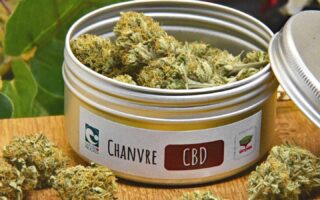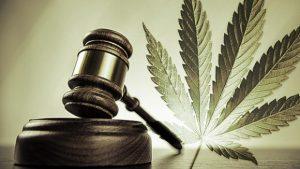In recent years, the rise of cannabidiol, commonly known as CBD, has sparked conversations and debates across various fields, from medicine to legal policy. As health enthusiasts champion its potential therapeutic benefits and entrepreneurs flood the market with a plethora of CBD-infused products, one pivotal question looms large: Is CBD a controlled substance? To navigate this complex landscape, one must delve into the intricate layers of legislation, scientific research, and public perception. This article will explore the current legal status of CBD, unraveling the nuances that differentiate it from its more notorious cousin, THC, and examining how regulatory frameworks vary from state to state and country to country. Join us as we demystify the status of CBD and uncover what it truly means for consumers, producers, and policymakers alike.
Table of Contents
- Understanding CBD: Classification and Legal Status
- The Science Behind CBD: Differentiating Between Cannabinoids
- Navigating the Legal Landscape: State vs. Federal Regulations
- Recommendations for Consumers: Making Informed Choices and Staying Compliant
- Q&A
- Wrapping Up
Understanding CBD: Classification and Legal Status
The classification of CBD (cannabidiol) largely hinges on its source and the presence of THC (tetrahydrocannabinol), the psychoactive compound found in cannabis. CBD is derived from both hemp and marijuana plants; however, most commercially available CBD products today come from hemp due to their lower THC content. According to various regulations, such as the 2018 Farm Bill in the United States, hemp-derived CBD (with less than 0.3% THC) is not classified as a controlled substance, allowing for its legal production and sale. This has fostered widespread availability and interest in CBD products across the country.
Despite its legal status at the federal level, it’s important to note that individual states may have their own regulations regarding the sale and use of CBD, leading to a patchwork of laws. Some states maintain strict regulations, while others embrace its therapeutic potential more fully. Key points to consider include:
- State Variability: Legalities can vary significantly from one state to another.
- Product Purity: Not all CBD products are created equal, leading to potential issues regarding quality and safety.
- Consumer Awareness: Educating oneself about product origins and concentrations of THC is crucial.
The Science Behind CBD: Differentiating Between Cannabinoids
Understanding the science behind cannabinoids, particularly CBD, involves delving into the intricate world of the cannabis plant. Cannabinoids, a diverse class of chemical compounds, interact with the body’s endocannabinoid system, which plays a crucial role in regulating various physiological processes. CBD, or cannabidiol, is one of over 100 cannabinoids identified in cannabis. Unlike its more infamous counterpart, THC (tetrahydrocannabinol), CBD is non-psychoactive, meaning it does not produce the “high” associated with marijuana use. This distinct characteristic positions CBD as a potentially therapeutic option without the associated risks of cognitive impairment.
The differentiation of cannabinoids extends beyond just psychoactivity. The following list summarizes key cannabinoids found in cannabis, highlighting their unique properties:
- THC: Psychoactive and known for its euphoric effects.
- CBD: Non-psychoactive, potentially anti-inflammatory and anxiolytic.
- CBG (Cannabigerol): Known as the “mother” of cannabinoids, it has potential antibacterial properties.
- CBN (Cannabinol): Formed from THC degradation, may aid in sleep.
- THCV (Tetrahydrocannabivarin): May aid in appetite suppression and has unique therapeutic potentials.
To better categorize these cannabinoids, consider the following table that compares their key effects:
| Cannabinoid | Psychoactive | Potential Benefits |
|---|---|---|
| THC | Yes | Euphoria, appetite stimulation |
| CBD | No | Anti-anxiety, analgesic |
| CBG | No | Antibacterial, anti-inflammatory |
| CBN | No | Sleep aid, relaxation |
| THCV | No | Appetite suppression, potential neuroprotective |
Navigating the Legal Landscape: State vs. Federal Regulations
Understanding the complex interplay between state and federal regulations is essential for anyone involved in the CBD market. While the federal government has classified hemp-derived CBD products as legal under the 2018 Farm Bill, state laws can vary significantly, leading to a patchwork of regulations. This divergence often results in confusion for consumers and businesses alike. Some states may impose additional restrictions or outright bans on the sale and use of CBD, while others have embraced it, establishing frameworks to facilitate its commercialization. As such, stakeholders must remain vigilant and informed about local laws, which can impact everything from product labeling to distribution.
While federal law provides a foundation for the legality of CBD products derived from hemp, it does not address all aspects, such as marketing claims or product safety standards. In many cases, state authorities may require additional compliance measures, resulting in a layered legal landscape. To illustrate the differences, consider the following key aspects of regulation:
| Aspect | Federal Regulation | State Variation |
|---|---|---|
| Legal Status | Legal if derived from hemp | Varies; some states ban or restrict |
| THC Content | Below 0.3% THC | Some states have stricter limits |
| Product Labeling | Must comply with federal standards | Additional state-specific labeling rules |
| Licensing Requirements | No national licensing | States may require specific licenses |
Recommendations for Consumers: Making Informed Choices and Staying Compliant
When navigating the complex landscape of CBD products, consumers should prioritize being informed about the legality and sourcing of these items. Researching the origin and manufacturing processes can greatly influence your purchasing decisions. Here are some tips to keep in mind:
- Check for Third-Party Testing: Ensure that the product has undergone rigorous testing by independent laboratories to verify its contents and potency.
- Read the Labels: Familiarize yourself with ingredient lists and concentration levels to know exactly what you’re consuming.
- Understand Local Regulations: Laws surrounding CBD can vary dramatically by region; stay updated on the legal status in your area.
Furthermore, understanding the difference between hemp-derived and marijuana-derived CBD is crucial for compliance and utilization. Hemp-derived CBD products, which typically contain less than 0.3% THC, are legal federally, whereas marijuana-derived products may not be. For clarity, refer to the comparison below:
| Type of CBD | THC Content | Legal Status |
|---|---|---|
| Hemp-Derived CBD | Less than 0.3% | Legal Federally |
| Marijuana-Derived CBD | More than 0.3% | Varies by State |
Q&A
Q&A: Is CBD a Controlled Substance?
Q1: What is CBD, and where does it come from?
A1: CBD, or cannabidiol, is a natural compound found in the cannabis plant, specifically in hemp and marijuana. Unlike THC (tetrahydrocannabinol), the psychoactive component that produces a “high,” CBD does not have intoxicating effects. It’s mostly derived from hemp, which contains minimal THC.
Q2: Is CBD legally classified as a controlled substance?
A2: The legality of CBD varies significantly by region. In the United States, the 2018 Farm Bill legalized hemp-derived CBD products with less than 0.3% THC, effectively removing them from the list of controlled substances. However, CBD from marijuana remains regulated and can be considered a controlled substance depending on state laws.
Q3: Are there any exceptions to the legality of CBD?
A3: Yes, while federally legal under specific conditions, several states still impose stringent regulations on the sale and use of CBD. Some states have opted to restrict all cannabis-derived products despite federal legalization, maintaining a controlled status for CBD derived from marijuana.
Q4: What about medical usage—does that change the classification?
A4: In some jurisdictions, CBD specifically formulated for medical use may have special exemptions, especially when prescribed by a healthcare professional. Such variations often depend on the regulations set by local health authorities and legal frameworks.
Q5: Can I travel with CBD?
A5: Traveling with CBD can be tricky! While you may carry federally legal CBD products in the U.S., state laws differ, and international travel can be even more complicated. Always check the specific regulations of your destination to avoid legal trouble.
Q6: Does the method of extraction or the type of product make a difference in legality?
A6: Yes, the method of extraction, as well as the source of the CBD (hemp vs. marijuana), plays a crucial role in determining legality. Products derived from industrial hemp with low THC levels are generally more widely accepted than those from marijuana, which may belong to a controlled substance category depending on local laws and regulations.
Q7: What should consumers look for to ensure they are using legal CBD products?
A7: Consumers should seek products that are transparent about their sourcing and testing. Look for third-party lab results that confirm the THC content and purity of the product. Additionally, familiarizing yourself with both federal and state regulations can provide a clearer understanding of what is considered legal in your area.
Q8: What does the future hold for CBD’s legal status?
A8: The future of CBD’s legal status seems to evolve with ongoing research and public interest. As more studies highlight its potential benefits and safety, it’s possible that stricter regulations may soften, leading to more widespread acceptance and clarity in legality—both at the state and federal levels.
Q9: Where can I find reliable information regarding CBD and its legal status?
A9: Trusted sources include government websites, legal resources, and industry-reputable organizations. Staying informed through updates from local health departments and legal entities can help ensure you have the latest information regarding CBD’s status as a controlled substance.
Q10: What’s the takeaway regarding CBD’s status?
A10: In a nutshell, while hemp-derived CBD is generally not considered a controlled substance at the federal level in the U.S., state laws vary significantly. Always perform your due diligence when purchasing or using CBD products to ensure compliance with local laws.
Wrapping Up
the landscape surrounding CBD and its classification as a controlled substance is as complex as it is evolving. While many consumers are drawn to the potential benefits of cannabidiol, navigating the regulatory maze can be daunting. As research continues to unfold and public opinion shifts, the legal status of CBD remains in a state of flux, varying not only by country but also by state and locality. Therefore, staying informed and aware of local regulations is essential for anyone considering its use. Whether you’re a seasoned user or a curious newcomer, understanding the boundaries of CBD’s legality can empower you to make informed decisions in this burgeoning market. As we move forward, one thing is clear: the conversation around CBD is far from over, and its role in health and wellness may just be beginning.

